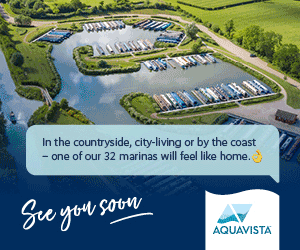Jo Bell
Archaeologist, poet and industrial historian Jo Bell came to wider boating attention in 2013 as the first Canal Laureate. In conversation with Andrew Denny, she talks about her new book, Boater: A Life on England’s Waterways

Robbie on the Regent’s Canal at Camden.
I wanted to write the book so I could put my life inside a much longer history. So many people now live on the canals and are making them their home, but have no real sense of the historic culture of working boats. Working boat culture wasn’t literate, it wasn’t really written down. The best commemoration of canal history is the boats themselves.
Historical context
It seems to me that the future of the canals depends very much on their history. I do say in the book somewhere, and I believe it, that the UK’s canals are one of humanity’s greatest achievements. It’s a bold statement but I absolutely believe it. They’re a damn sight more useful than, say, Hadrian’s Wall.
The hardest thing to understand in history is what it was like before something happened – why it was necessary to invent something. The way to do that is to vividly imagine the world before [canals] existed. Readers can consider themselves very lucky it didn’t turn into a whole book about packhorses – I found that whole subject absolutely fascinating.
In order to make the Industrial Revolution happen – as Wedgwood imagined it, as others imagined it – you’ve got to have an infrastructure that can accommodate it. The resources you need to connect aren’t very far apart and the obstacles aren’t that great – it’s the Pennines, not the Alps.
It became clear that people, charismatic people, made these things happen. Wedgwood, Telford, Brindley. Most of them knew each other. And it wasn’t a London phenomenon – it was a Midlands and northern phenomenon, driven by London’s money but not its imagination. The canals were like jump leads: they connected the terminals and allowed the energy to flow.
There’s a section early in the book – moving a piano in 1766 – which was one of the first things I wrote. I wanted to explain the necessity of canals. The best way to do that was to show how difficult a single journey would have been, especially with a bulky cargo. To make people laugh but also to make them say, ‘oh yeah!’
In 2016 I did a half-hour docu-poem on Radio 4 called Slow Machine. I thought of England as a slow machine – and the canals, the boats and the people were part of that machine, for commerce and for money-making.
Life choice
What I didn’t want to do was another one of those books that said: “I was a stockbroker in Islington and I tried the idyllic canal life but then I had to empty a chemical toilet and went back.” There are lots of books like that. What I’ve tried to get across is that it’s not a lifestyle. For me, it’s a life.
It’s evolving – there’s no point wishing that canal culture was exactly what it was 20 or 70 years ago. It’s evolving into a new thing, partly about overflow housing. And that’s not a problem. I don’t want to be one of those naysayers who pulls the ladder up behind me. But the infrastructure has to be able to support it.
What’s important, I think, is that boaters themselves are shaping the new culture. It’s not just nostalgia – it’s active, communal and often inventive. There are still music, art, poetry, people repairing things by hand. It’s not always picturesque but it is rich. The canals are no longer a forgotten backwater. They’re being lived in, loved, argued over, which means they’re alive.






